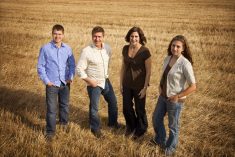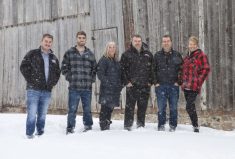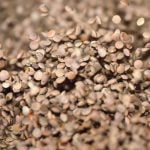Have you ever wondered why one family member considers it the end of the world when another family member leaves an empty water bottle in the combine? Or why, knowing this, another family member will check the cab and toss out the offending bottle in order to keep the peace, while another family member will dramatically throw up his hands during a meeting, as if to say, “Oh, brother, what a waste of time working with people like you who just don’t get it!”
In one version or another, these are scenarios that most farm families are familiar with because, according to Gordon Colledge, a farm adviser in Lethbridge, Alta., they demonstrate the different basic personality types.
Read Also

Sibling squeeze part 6: The emotional stakes of a family legacy
The final instalment in a six-part series exploring the challenges of sibling conflict and the effect it can have on…
Colledge uses personality tests like True Colors to help families work together more effectively. In its approach, True Colors uses four colours to identify distinctive perspectives and personalities. Most of us have a dominant colour and are influenced or shaded by the other three colours, which gives us our spectrum.
“When I use it, there are fewer arguments,” says Colledge. Other family members learn that the “Gold” personality needs organization, lists, rules, and punctuality. The “Orange” likes to wing it, working out the details as they go along. “Blues” are true and loyal, hate conflict, and will exhaust themselves trying to keep the peace or put out fires. The “Green” is like Spock in “Star Trek,” logical, pragmatic, and showing little or no emotion.
If it sounds like pseudo-science, Colledge begs to differ. He says that when working with farm families, the system helps him determine everyone’s personalities and their needs, along with the stressors and joys that go with each personality type. Family members also come to better understand each other, which in turn leads to better communication and less conflict, he says.
- More with Helen Lammers-Helps: It’s not ‘one size fits all’ when it comes to team building on the farm
Doing the personality assessment as a group with a trained facilitator is even better, he says, helping everyone see the impact of personality on how different family members will react in different situations.
Boissevain, Man. farm family coach Elaine Froese agrees that these types of tests can be useful. She is certified to use the CRG Personal Style Indicator assessment tool. After using it with clients, she has heard them exclaim, “I wish I would have done this 10 years ago.”
According to its website, CRG claims its 20-page Personal Style Indicator assessment will help you discover your inherent personal style and natural preferences towards time, people, tasks and situations. The site says it will also help you become more aware of your typical reactions to stress, determine your preferred work environment, and know your strengths and challenges while also improving your understanding of others’ tendencies.
These are just two of the personality tests available for farm use. There are others too. Michelle Painchaud, CEO of Painchaud Performance Group in Winnipeg, Man. likes the tools that are based on a large pool of responses like the one offered by Profiles International.
Painchaud says these psychometric assessments are a very valuable tool in understanding an employee’s thinking and learning styles as well as their behavioural traits. They are useful for hiring and also to help understand and build teams, she says. “They can be really helpful because we all think differently; our brains are different.”
There are also self-reporting types of personality assessments that you can do yourself. Froese has one on communication styles that she hands out at her workshops. (It’s also available by emailing her at [email protected] and putting “communications style” in the subject line).
“Some people find them helpful,” says Froese. “It makes them become more aware.”
Mike Bossy, president of Bossy Nagy Group in Tillsonburg, Ont. uses the Kolbe A Index personality test. He first took the test himself when he was a participant in a coaching course. “It was a big aha! moment for me,” Bossy says. “It described how I took action perfectly.”
Like many of the personality tests, the results classify people according to their dominant personality style. In the case of the Kolbe A Index, the categories are Fact Finder, Follow Thru, Quick Start and Implementer.
Understanding your dominant action modes helps families work together, says Bossy. “By understanding your natural inclinations you can work around them.”
Bossy adds that it’s important to remember there are no bad scores: “All personality styles are equally valid. All kinds of people are needed on the team.”
Bossy also says there are many ways to use the test results. They can be used to reassign responsibilities according to each person’s strengths. For example, someone who is a Quick Start isn’t the right person to buy the tractor. That job should go to someone who is more analytical, he says.
If your books and files are a mess, likely the person doing them is lacking in the Follow Thru category. “Hire someone who will make up for this,” says Bossy.
By understanding your own natural inclinations, Bossy says you can create habits that help you overcome your challenges. For example if “Follow Thru” is not one of your strengths, create artificial deadlines for yourself, he says.
This insight can also be used to improve personal relationships. Bossy tends to be impulsive so he has put a habit in place to modify his instincts: “Now I always check with my wife before accepting a dinner invitation.”
Bossy has also used the personality assessment tool to help young people sort out their best career options.
Yet personality assessments have their drawbacks as well. Painchaud cautions there are many options available, and if someone doesn’t truly understand how to find a scientifically validated assessment, they may end up with a useless and potentially disruptive assessment.
Painchaud also has concerns about the self-reporting type. The problem with these, she explains, is that people may not have an accurate self-perception. She warns that if the self-reporting kinds of assessments aren’t handled appropriately, things can go bad. “They can create animosity,” she says.
Wendy Sage-Hayward, is a family enterprise adviser with the Family Business Consulting Group and adjunct professor at the University of British Columbia’s Sauder School of Business. She also sits on the board and is a shareholder in a large multi-generation family-owned hog farm in Iowa. She is certified to use the Insights Discovery Personality Assessment which she has used with people at all levels in business including front line staff, executive teams and boards of directors.
“The assessment gives you a framework and a language to talk about things,” Sage-Hayward says. “The downside is that labels put a person in a box.” The other problem, she says, is that no tool can describe the full complexity of humans.
The issue of creating labels for people is the reason Pam Paquet, a psychologist and business coach in Port Coquitlam, B.C. has shied away from using them with groups. “While they can be useful to help an individual become more self-aware and change their behaviour, when it comes to families or groups, people often use the results as an excuse for bad behaviour,” she says.
The purpose for the tests should be to create change but they don’t seem to work that way, she says. “Once people have the results, there doesn’t seem to be an impetus to keep going,” she explains.
Colledge agrees that the personality assessment works best when people look at the areas where they are weak and focus on those. “You can’t change your personality,” he says. “But you can change your behaviour.”
This article was originally published as “Who are they really?” in the April 2015 issue of Country Guide
















